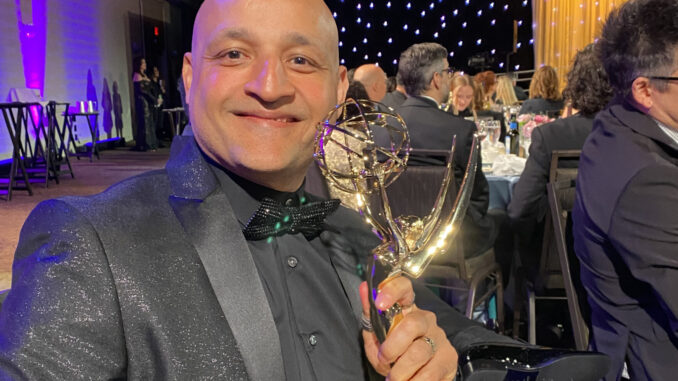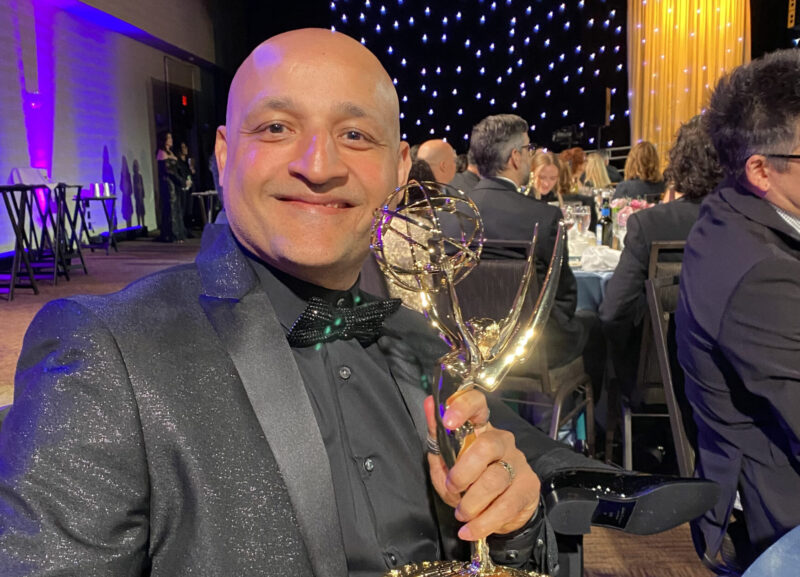
Where are you working at the moment?
I am a freelancer and currently working on some different projects. It’s a dynamic situation that allows me to work with all kinds of storytellers and I really like it. The freedom to choose a project that matches my creative goals and values is also very meaningful.
Current project:
Last year, I played a key role in three independent feature films. Genres include romantic comedy, drama and thriller. There are also Netflix specials in the entertainment documentary space. For each project, I oversee the editing process from rough cut to final delivery. Some of these projects are in different languages and I never shy away from the challenge. I think this is an opportunity to expand my creative and cultural perspective.
Describe your work:
The editor’s job is to shape the original lens into a cohesive, engaging story that resonates with the audience. It’s not just cutting and trimming; it’s about choosing the right moments, lines and scenes to tell the story correctly and evoke the emotions needed. Editors work closely with directors to understand their vision, and it is their job to bring this vision to life through careful editing.
Editors are responsible for pacing, timing and rhythm, deciding how scenes flow to each other, where tension is built and where release is released. They ensure clear, engaging, and influential narratives, often suggest changes or adjustments to enhance storytelling.
The editor’s role is crucial to any project, whether it’s a movie, a TV show, a commercial or a music video. Without editing, a project will remain a series of disconnected moments, ideally, it will be a seamless, emotional journey. Movies can be really made or destroyed in the editorial room. Usually in post-production, the story takes the final, usually the most powerful form.
Editors are storytellers. In addition to using their creativity and technical knowledge when tailoring pictures, they also oversee the work of key craftsmen who use their respective techniques to create soundscapes, visual effects, and more. Their contribution helps turn hours of lenses into polished finished products. By aligning with the director’s vision and adjusting the emotional undercurrents in each scene, the editors ensure that the final work is technically not only technically sounds like a movie, but also narratively, but emotionally resonant. After all, if the audience is not connected to the final product, the story doesn’t fully complete the work.
How did you become interested in this work in the first place?
Honestly, I never thought I would be an editor, nor would I be who I am today. When I started learning computer programming at school, it all started. I am a naturally curious kid who always wants to know what is inside the computer. By the time I was 14, I had assembled my first Windows computer and started teaching myself a variety of software for graphic design. A few months later, I started learning 2D and 3D animation.
As early as the mid-1990s, animation employment was restricted. Fortunately, this took me in a different direction. My cousin helped me connect with a film company whose post-production department has an animation suite and three editing rooms that handle film and television works. I didn’t answer the phone immediately, but I persevered and checked it out frequently. Ultimately, the studio manager gave me the position of assistant editor, and that’s where my journey began.
Who gives you your first rest time?
The studio manager and my mentor believe in my potential and enable me to prove myself. Their trust and support made everything different early in my career. It’s also important that I won’t be here without the firm support of my family. They are encouraging me to follow my dreams, always standing by my side and believing in the key role of my path, even if it is not the easiest or most traditional.
What was your first union job?
AMC Docudrama “Production of the Mob: New York”. The eight-part mini series produced by Stephen David Entertainment premiered in June 2015 and delves into the rise of five organized criminal families that shaped the modern American mafia. The series features dramatic reenactments, archival clips and interviews with prominent figures such as Ray Liotta (who narrates the series), Joe Mantegna, Drea de Matteo and former New York City Mayor Rudy Giuliani. The show has received wide ratings, with the premiere series attracting 1.7 million viewers.
What credits or programs are you most proud of and why?
Honestly, I love my job and can’t imagine doing anything else. I am proud of every project I participate in, whether it’s commercials, music videos or feature films. I have the opportunity to work on all types, which helps shape my versatility and storytelling instinct. One of the highlights of my career was winning the Emmy Award during the Day last year, which reminds people of the impact of hard work, dedication and passion. Every experience helps me grow and I am proud of the dedication and inner self that comes with every job.
What is your biggest challenge at work (or in a specific project)? How did you overcome/solve?
I think every job faces unique challenges, but one of the biggest jobs is trying to create something that doesn’t exist. You usually start from scratch just with an idea or concept, depending on how you bring it to life in a compelling way. It is a fact when creating a story, and it is also true when editing a project.
One of the best advice I received early in my career is: Don’t consider the first thought that comes to mind. That stuck with me. Since then, I have learned to take a step back, sleep, and let my ideas develop. Give myself this space to help me come up with more thoughtful and creative solutions.
What is the most interesting thing in your work?
For me, the most interesting thing is always from working with like-minded creative people. When I was in India, I worked on a Hong Kong-based music network called Channel [V]this is one of the most exciting experiences of my career. We have complete creative freedom to bring our thoughts to life in our own way.
It’s a wild and inspiring environment. We gathered in the evening and, driven by the same energy and passion, came back to complete our mission. It never felt like “work”, and this creative atmosphere made it really memorable.
Jobwise, what do you want to do in five years from now?
I see myself editing high-profile feature films full time and working with top directors and storytellers. I want to be involved in projects that push creative boundaries and connect with audiences around the world. My goal is not only to work in the film, but to make a real impact through the stories I helped shape while bringing the director’s vision to life.
What are your external activities, hobbies, passions?
Spending time with my daughter is everything to me. One of our favorite things is watching movies together. It’s not just a movie; it’s about sharing that moment, laughing, reacting and seeing the world through her eyes. She loves watching projects I work on and is very excited to find my name in credits. It was one of the most inspiring feelings that reminded me of why I was doing my own thing.
I like hiking, too. Shown in nature can enrich me, reflect and often trigger new ideas.
I really like to hold parties. Get people together, create memories, and fill with good energy, food and laughter with something special.
Favorite movie? Why?
One of my favorite movies of all time is “Schindler’s List”. It’s not just a movie; it’s an excellent emotional journey that leaves a lasting impact. It portrays humanity, the way it loses and redemption is very powerful. Steven Spielberg’s guidance combined with Michael Kahn’s superb editing creates a narrative that is both plaguing and deeply human. The decision to shoot in black and white, using silence at critical moments and a restricted but influential rhythm all contribute to the emotional weight of the film.
As a post-production guy, I’m constantly inspired by how films balance such heavy themes with elegance and cinematic beauty. It reminds me of the responsibilities we take as storytellers, not only for entertainment, but for the preservation of truth, inspire thoughts and inspire emotions. “Schindler’s List” is a movie that will always be with you, and for me it’s the highest mark of Great Cinema.
Favorite TV show? Why?
Some stand out among the recent “White Lotus,” “Our Last” and “Adolescent.” These are not just entertainment shows; they are with you for a long time after the lender rolls up. They inspire emotions, trigger meaningful conversations, and demonstrate the possibilities that are possible when guiding, editing, performing, and writing. Whether it is the social commentary of “White Lotus”, the primitive human beings of “Our Last”, or the fragile truth captured in “puberty,” everyone offers something emotionally rich and narratively powerful.
Do you have an industry mentor?
Traditionally, I don’t have a mentor, but I think all my peers are mentors in their own way. I believe everyone has some valuable teaching and I will try to learn from everyone I work with, whether it is a creative approach, a technical skill, or the way they deal with challenges. This mentality helped me grow professionally and personally.
What advice would you give to those interested in pursuing a job?
You must set clear goals for what you want to achieve and stick to them. In the early 1990s, when I was working in Bollywood, I always wanted to move to Los Angeles and work in Hollywood. It felt like a distant dream at the time, but I set this goal and through lasting, passion and hard work, I finally achieved it.
One of the most important advice I can offer is always willing to learn and be modest. Show your creativity and explain the reasoning behind your decisions, but also understand that not every idea will lay off employees, that’s OK. It’s a collaborative industry where we work together to create something great. It all has to do with teamwork, flexibility and being open to new ideas.
Has this ever happened when you had to rely on the guild for help or help?
I rely on guilds to support every union job. As creatives, we often focus on the work itself, so it is important to have guilds to ensure we are protected, especially on changing contract terms. Whenever I have questions or need clarification, I do not hesitate to contact our on-site representative for guidance. Knowing that our support has allowed me to focus more on the creative process and to rest assured that I am not alone in the business side of things.
What do you want to say to your guild members, and some encouragement?
I know the past few years have been extremely challenging for all of us, but I really believe that the brighter and brighter days have moved forward. Stay strong, stay positive, and remember that every challenge is an opportunity to grow. In difficult times, creativity doesn’t stop – it keeps evolving. We have witnessed first-hand the resilience and adaptability of our community, which gives me hope. Now is more important than ever. Together, we have the ability to achieve incredible things. Our unity is our strength, and with us we cannot overcome.
Compiled by David Bruskin.


